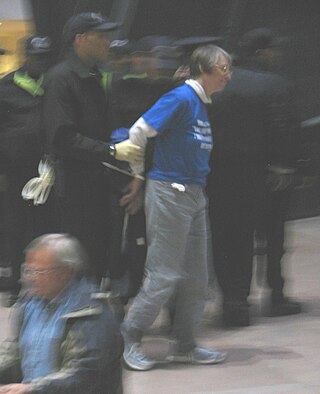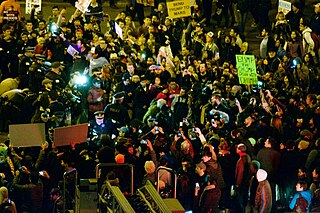Related Research Articles

Beginning in late 2002 and continuing after the 2003 invasion of Iraq, large-scale protests against the Iraq War were held in many cities worldwide, often coordinated to occur simultaneously around the world. After the biggest series of demonstrations, on February 15, 2003, New York Times writer Patrick Tyler claimed that they showed that there were two superpowers on the planet: the United States and worldwide public opinion.
Free speech zones are areas set aside in public places for the purpose of political protesting. The First Amendment to the United States Constitution states that "Congress shall make no law ... abridging ... the right of the people peaceably to assemble, and to petition the Government for a redress of grievances." The existence of free speech zones is based on U.S. court decisions stipulating that the government may reasonably regulate the time, place, and manner – but not content – of expression.

The 2004 Republican National Convention took place from August 30 to September 2, 2004, at Madison Square Garden in New York City, New York. The convention is one of a series of historic quadrennial meetings at which the Republican candidates for president and vice president, and party platform are formally adopted. Attendance included 2,509 delegates and 2,344 alternate delegates from the states, territories and the District of Columbia. The convention marked the formal end of the active primary election season. As of 2023, it is the most recent major-party nominating convention, as well as the only Republican National Convention, to be held in New York City.

The 2004 Democratic National Convention convened from July 26 to 29, 2004 at the FleetCenter in Boston, Massachusetts, and nominated Senator John Kerry from Massachusetts for president and Senator John Edwards from North Carolina for vice president, respectively, in the 2004 presidential election.

2004 Republican National Convention protest activity includes the broad range of marches, rallies, performances, demonstrations, exhibits, and acts of civil disobedience in New York City to protest the 2004 Republican National Convention and the nomination of President George W. Bush for the 2004 U.S. presidential election.

In the discourse, a heckler's veto is a situation in which a party who disagrees with a speaker's message is able to unilaterally trigger events that result in the speaker being silenced. For example, a heckler can disrupt a speech to the point that the speech is canceled.

The 2008 Republican National Convention took place at the Xcel Energy Center in Saint Paul, Minnesota, from September 1, through September 4, 2008. The first day of the Republican Party's convention fell on Labor Day, the last day of the popular Minnesota State Fair, though because of Hurricane Gustav, this day was mostly a call for action to help victims and formal, required activities; most of the politicking and partying did not start until Tuesday, the second scheduled day.

Raymond McGovern is an American political activist and former Central Intelligence Agency (CIA) officer. McGovern was a CIA analyst from 1963 to 1990, and in the 1980s chaired National Intelligence Estimates and participated in preparing the President's Daily Brief. He received the Intelligence Commendation Medal at his retirement, returning it in 2006 to protest the CIA's involvement in torture. McGovern's post-retirement work includes commenting for RT and Sputnik News, among other outlets, on intelligence and foreign policy issues. In 2003 he co-founded Veteran Intelligence Professionals for Sanity (VIPS).

Cindy Lee Sheehan is an American anti-war activist, whose son, U.S. Army Specialist Casey Sheehan, was killed by enemy action during the Iraq War. She attracted national and international media attention in August 2005 for her extended antiwar protest at a makeshift camp outside President George W. Bush's Texas ranch—a stand that drew both passionate support and criticism. Sheehan ran unsuccessfully for Congress in 2008. She was a vocal critic of President Barack Obama's foreign policy. Her memoir, Peace Mom: A Mother's Journey Through Heartache to Activism, was published in 2006. In an interview with The Daily Beast in 2017, Sheehan continued to hold her critical views towards George W. Bush, while also criticizing the militarism of Donald Trump.
Gold Star Families for Peace (GSFP) is a United States-based organization founded in January 2005 by individuals who lost family members in the Iraq War, and are thus entitled to display a Gold Star. It is considered an offshoot of Military Families Speak Out. Gold Star Families for Peace now includes more than 65 families of troops killed in Iraq.
Camp Casey was the name given to the encampment of anti-war protesters outside the Prairie Chapel Ranch in Crawford, Texas during US President George W. Bush's five-week summer vacation there in 2005, named after Iraq War casualty US Army Specialist Casey Sheehan.

On January 20, 2005, a number of counter-inaugural demonstrations were held in Washington, D.C., and other American cities to protest the second inauguration of President George W. Bush.

The Bring Them Home Now Tour was a rolling anti-war protest against the Iraq War in the United States, beginning in Crawford, Texas, travelling three routes across the country and culminating in a rally in Washington, D.C. in September 2005. The tour was organized by Gold Star Families for Peace, Iraq Veterans Against the War, Military Families Speak Out, and Veterans For Peace. It was inspired by and featured Cindy Sheehan as a speaker at many rallies. The three tour buses were purchased with donated money.

In the 1960s, several "be-ins" were held in Central Park, Manhattan, New York City to protest against various issues such as U.S. involvement in the Vietnam War and racism.

The September 15, 2007 anti-war protest was a march from the White House to the United States Capitol. It was organized by Veterans for Peace and the ANSWER Coalition. Volunteers were recruited for a civil disobedience action, which included a die-in. Volunteers signed up to take on the name of a soldier or civilian who died because of the war, and lay down around the Peace Monument. In attendance were public figures such as Cindy Sheehan and Ralph Nader. Police arrested more than 190 demonstrators who crossed police lines in front of the Capitol. Chemical spray was used by Capitol Police.

March 19, 2008, being the fifth anniversary of the United States 2003 invasion of Iraq and in protest and demonstration in opposition to the war in Iraq, anti-war protests were held throughout the world including a series of autonomous actions in the United States' capitol, Washington, D.C., in London, Sydney, Australia, and the Scottish city of Glasgow with the latter three being organized by the UK-based Stop the War Coalition. Actions included demonstrations at government buildings and landmarks, protests at military installations and student-led street blockades. The protests were notable, in part, for mostly replacing mass marches with civil disobedience – including religious-focused protests – and for utilizing new technologies to both coordinate actions and interface with traditional print and broadcast media.

Barack Obama, the 44th president of the United States, was involved in multiple security incidents, including several assassination threats and plots, starting from when he became a presidential candidate in 2007. Secret Service protection for Obama began after he received a death threat in 2007, while serving as the junior United States senator from Illinois and running for president. This marked the earliest time a candidate received such protection before being nominated. Security was increased early for Obama due to fears of possible assassination attempts by white supremacist or other racist groups or individuals against the first African American major party presidential nominee.

A counter-protest is a protest action which takes place within the proximity of an ideologically opposite protest. The purposes of counter-protests can range from merely voicing opposition to the objective of the other protest to actively drawing attention from nearby media outlets away from the other protest toward the counter-protestors' cause to actively seeking to disrupt the other protest by conflict of a non-violent or violent nature.

On March 11, 2016, the Donald Trump presidential campaign canceled a planned rally at the University of Illinois Chicago (UIC), in Chicago, Illinois, citing "growing safety concerns" due to the presence of thousands of protesters inside and outside his rally.

The following is a timeline of the protests against Donald Trump, the former president of the United States of America, businessman, and television personality.
References
- ↑ via Associated Press. "As New York prepares for Bush, protests gather pace", Taipei Times , August 30, 2004. Accessed February 16, 2011. "Sue Niederer of Pennington, New Jersey, who lost her son Seth Dvorin in Iraq earlier this year, grieves at a memorial yesterday, in Central Park in New York."
- ↑ "No Charges Against NJ Woman Who Heckled Mrs. Bush". The Rogan Board. Retrieved 2010-06-05.